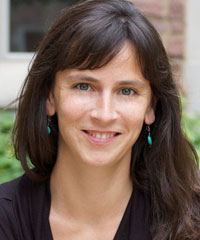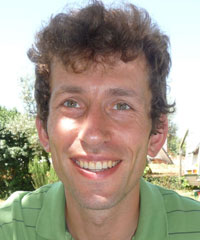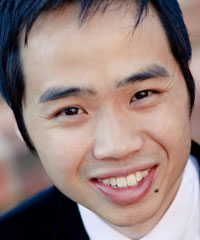Rising Stars
 Bridgid Finn
Bridgid Finn
Washington University, USA
http://sites.google.com/site/bridgidfinn2/
What does your research focus on?
My research is focused on the cognitive processes that are involved in regulating memory and learning. Much of my research targets how metacognition is used to guide learning. Specifically, I’m interested in identifying the biases that affect how people make assessments about their knowledge, and how these biases affect decisions about learning. Recently, I have been working on understanding the mechanisms involved in memory retrieval, and in particular the role that reconsolidation and post retrieval processes may play in strengthening memory after retrieval.
What drew you to this line of research? Why is it exciting to you?
I’ve always been fascinated by the idea that our memories — and how we think about and evaluate them — make us who we are. Metacognition is intriguing to me because we use it to interpret the content of our minds, and also to have some control over what the content is. The mistakes that we sometimes make in our metacognitive evaluations can reveal what characteristics of an experience are most salient or important to us.
Who were/are your mentors or psychological influences?
My graduate advisor, Janet Metcalfe of Columbia University, was, and continues to be, an incredibly important influence and mentor. While I was at Columbia, I also had the wonderful chance to collaborate with Tory Higgins, which expanded my thinking about metacognition into the social domain. During my post doc at Washington University I have had the opportunity to be mentored by such great thinkers as Henry (Roddy) Roediger, Kathleen McDermott, and Larry Jacoby. Outside of the labs I have worked in directly, the work of William James, Frederic Bartlett, Daniel Kahneman, and Asher Koriat have been important influences on my thinking about how we remember and how we evaluate what we know.
To what do you attribute your success in the science?
Any success that I could possibly claim at this point is due to my generous advisors and colleagues and to my supportive family. I have been extremely fortunate to work with and draw inspiration from mentors whose combined experience, creativity, and knowledge have helped shape my research. I’ve also had a steady stream of incredible labmates over the years.
What’s your future research agenda?
I plan to continue exploring how we remember and learn. For example, how and why are memories strengthened following their reactivation? I’ve also recently started exploring how affective responses to different learning experiences can influence how we make future study decisions. For example, some of my projects have shown that metamemory judgments are particularly sensitive to memory failures, and that this sensitivity has an important impact on future study choices. I’m also interested in how students value the process and the outcomes of learning. Is it rewarding to successfully retrieve information from memory? Is it more or less rewarding when the correct answer comes to mind easily as compared to when the process is more effortful?
Any advice for even younger psychological scientists? What would you tell someone just now entering graduate school or getting their PhD?
I’ve always found it really useful to pay attention to scholarship in other areas. I enjoy hearing talks in the philosophy and political science departments, as well as in other areas of psychology. A number of my research ideas came from tuning in to work going on in judgment and decision-making fields. Hearing from other disciplines has helped me to think in a more rich and complex way about my own questions in psychology and gave me a larger set of tools for thinking up experimental manipulations and for analyzing data.
Take a risk now and then. If you’re lucky you’ll have a mentor who will let you try a risky idea out — and it might just work out. Just make sure that you’ve also got a steady stream of solid, workhorse projects that will help to pay the bills.
Keep at it! Your writing, your thinking, your talks, your ideas for experiments — all will get better with experience.
What publication are you most proud of or feel has been most important to your career?
Finn, B. & Roediger, H. L. (2011). Enhancing retention through reconsolidation: Negative emotional arousal following retrieval enhances later recall. Psychological Science, 22, 787-794.
In this paper we explored the role that reconsolidation may play in strengthening a memory following its reactivation. We found that emotional events that occur just after retrieval enhance later recall, implicating a process of reconsolidation whereby memories are subject to modification upon their reactivation. One of the reasons that I like this paper is because it attempted to synthesize findings from several areas of psychology (neurobiology, animal learning, human memory, and emotion) to get at the central question of why retrieval benefits memory. The research also broadened my thinking about the nature of memory retrieval in general — asinvolving a period of processing that follows successful retrieval in addition to the processes involved in the retrieval attempt.
 Iris Kolassa
Iris Kolassa
University of Ulm, Germany
http://www.uni-ulm.de/en/in/psy-paed/professuren/klinbiopsy/staff/prof-dr-iris-tatjana-kolassa.html
What does your research focus on?
I have two research interests: First, the consequences of (traumatic) stress on the brain, the mind, and one’s molecular biology. Second, changes in the brain in aging and mild cognitive impairment as well as Alzheimer’s disease and the role of physical exercise and cognitive trainings in preventing age-related cognitive decline.
What drew you to this line of research? Why is it exciting to you?
Both are major societal topics, and in both there is the potential to change something for the better if we are able to understand the relevant pathways better — either through treatment or interventions or lifestyle changes. And both fields are just really interesting!
Who were/are your mentors or psychological influences?
There were many people who influenced me and who should be mentioned here. However, some need a special thank you, and this select group certainly includes Thomas Elbert from the University of Konstanz. He was a fantastic mentor and inspired my research in many ways. He also always had the right words in all types of situations. Other important mentors were Brigitte Rockstroh of the University of Konstanz and Dominique de Quervain of the University of Basel, but also institutions such as the Zukunftskolleg of the University of Konstanz — a rather stimulating place where excellent postdoctoral fellows from various fields of research work freely and independently as fellows and exchange ideas across disciplines. Furthermore, we had great support in realizing our ideas — my time in the Zukunftskolleg was tremendous!
To what do you attribute your success in the science?
I am, through and through and with all my heart, a researcher. Furthermore, I have a high energy level, a high level of endurance, and a new research idea always in mind. Finally, my own enthusiasm is contagious.
What’s your future research agenda?
The molecular psychology of traumatic stress.
Any advice for even younger psychological scientists? What would you tell someone just now entering graduate school or getting their PhD?
At least in Germany the funding situation for doctoral students or postdocs is often uncertain. People hope for a new grant to be approved, and it may come or not. However, if you really want to go this way, there will always be — sooner or later — a solution! So keep on going!
Another important point I would like to share with younger psychological scientists: Do not be too overcritical a reviewer when you come into the position of reviewing journal articles or grant proposals.
What publication are you most proud of or feel has been most important to your career?
This is definitely the paper on the role of the alpha-2b adrenergic receptor in emotional memory formation:
de Quervain, D. J.-F., Kolassa, I.-T., Ertl, V. Onyut, P. L., Neuner, F., Elbert, T., & Papassotiropoulos, A. (2007). A deletion variant of the α2b-adrenoceptor is related to emotional memory in Europeans and Africans. Nature Neuroscience, 10(9), 1137-1139.
It fascinates me that something that is adaptive in one context (deletion-variant carriers of this receptor have better emotional memories) can be maladaptive in another situation (deletion-variant carriers also have more intrusions, i.e., a form of emotional-fear memory, after traumatic stress).
 Catherine J. Norris
Catherine J. Norris
Dartmouth College, USA
http://www.dartmouth.edu/~psych/people/faculty/norris.html
http://norris.socialpsychology.org/
What does your research focus on?
I’m interested in how individuals differ in their responses to emotional stimuli, how these emotional responses are affected by social factors, and the consequences of these patterns of responding for mental and physical health. I’m currently pursuing these interests in three separate lines of research. First, I study basic emotional processes like the negativity bias, the propensity to respond stronger to unpleasant than to pleasant events, and how they differ across individuals. For example, we have found that neurotic individuals show larger and more extended skin conductance responses to emotional (particularly unpleasant) images, suggesting that they are both more reactive and less able to regulate their responses, a pattern that could affect physical health over the lifecourse. Second, I’m investigating emotional processes involved in social exclusion, or the feeling that one’s social connections are lacking. Using fMRI, we have found that both chronically lonely individuals and participants experiencing acute social exclusion in the laboratory show decreased activation of the mentalizing network (e.g., TPJ, mPFC) when viewing pictures of people in distress. Third, I’m applying some of my work on interactions between emotional and social cognitive processes to study race bias, or negative feelings toward outgroup members.
What drew you to this line of research? Why is it exciting to you?
I became interested in emotion research as an undergraduate at the University of Chicago, after taking a class with Nancy Stein. Emotions are critical for survival, they guide our behavior in adaptive (and sometimes maladaptive) ways, and they exert a broad influence on psychological processes. I was also drawn to the interdisciplinary, multi-method approach that is inherent to the study of emotion, and that is illustrated so well by John Cacioppo’s (University of Chicago) work. I continue to be excited by learning new methods (most recently, structural neuroimaging) and applying them to test the psychological questions that I’m pursuing.
Who were/are your mentors or psychological influences?
I have been lucky to have worked with an amazing set of people over the course of my career. John Cacioppo, my graduate advisor, continues to be an inspiring mentor, a model researcher, a strong collaborator, and a good friend. Richie Davidson of the University of Wisconsin, Madison, Jeff Larsen of Texas Tech University, Jackie Gollan of Northwestern University, Gary Berntson of the Ohio State University, Penny Visser of the University of Chicago, Howard Nusbaum of the University of Chicago, Larry Barsalou of Emory University, and Steve Small of the University of California, Irvine have all greatly contributed to my growth as a researcher, a thinker, and an academic. Finally, I am incredibly fortunate to belong to a department that provides strong mentorship and that continues to support my development as a scientist.
To what do you attribute your success in the science?
Whatever success I have achieved is due to my wonderful mentors and collaborators. Science is not an independent enterprise, and the kind of interdisciplinary approach that characterizes my work relies heavily on relationships with other talented individuals. My students, both at the undergraduate and graduate level, are also critical for my intellectual growth and success. I’ve had the pleasure and honor of working with some amazing students – Sarah Henderson, Maital Neta, Rob Chavez, Katie Powers, and Zachary Ingbretsen, to name a few (all future Rising Stars!).
What’s your future research agenda?
One new focus that has emerged in my laboratory in the past few years concerns the positive consequences of the experience of ambivalence, or feeling good and bad at the same time. Many researchers have proposed that ambivalence is unstable and unpleasant, as it fails to provide behavioral guidance. New research, however, has begun to suggest that ambivalence also promotes behavioral flexibility, which may be important both for psychological well-being (older people report more ambivalence, which could lead to increased positivity even in the face of unpleasant events), as well as cessation of addiction behaviors (smokers that report more ambivalence are more likely to quit).
In a separate line of research, I’m interested in trying to understand how chronic (loneliness) and acute (social rejection) experiences of social exclusion are similar and/or different. The literature generally tends to group these experiences together, without considering the psychological processes that may differ between them. Ultimately, differences in these psychological processes may help shed light on reparative mechanisms that are effectively (or ineffectively, as the case may be) engaged.
Any advice for even younger psychological scientists? What would you tell someone just now entering graduate school or getting their PhD?
Have fun! Academia is an amazing lifestyle — you get to ask and answer questions that you care about. You get to work with smart, talented, interesting people. Take advantage of your intellectual freedom. Stay curious and remain open to new ideas. And when you get three manuscript/grant rejections in a week (which you will), remember these things and dig deep into the passion you have for research.
What publication are you most proud of or feel has been most important to your career
Norris, C. J., Gollan, J., Berntson, G. G., & Cacioppo, J. T. (2010). The current status of research on the structure of affective space. Biological Psychology: Special Issue on Emotion, 84, 422-436.
I am proud of this paper because it allowed me to summarize, unite, and extend much of the research that I’ve done on basic emotional processes in a single, common structure. In addition, we proposed a number of new hypotheses regarding how emotion functions, which have ultimately provided me with a scaffolding for future research. The opportunity to expand the theory that guides much of my research was a privilege and provided the occasion to reflect on what the field of emotion research has accomplished and what questions remain.
 Atsushi Senju
Atsushi Senju
Birkbeck, University of London, UK
http://www.cbcd.bbk.ac.uk/people/scientificstaff/atsushi
What does your research focus on?
My research focuses on the typical and atypical development of the “social brain” — the network of neural structures specialized to process the social world that enables us to learn effectively from, interact with, and influence the behavior of others. I want to understand how young infants achieve these amazing abilities and how these capacities shape the development of adult social skills. I am interested in the reasons why individuals with autism, a developmental disorder characterized by profound difficulties in social interaction and communication, have difficulties in developing effective social skills.
What drew you to this line of research? Why is it exciting to you?
I am fascinated by human society and how its size, complexity and distinctiveness from other species are fundamental to our survival and prosperity. It was greatly reinforced in the final year of my BA, when I worked with children with autism and was surprised to learn how subtle atypicalities in social skills could have such a profound impact on quality of life. The experience has made me passionate about determining the mechanisms underlying atypical development of social skills in autism, which will hopefully lead to the development of useful interventions, training, and support.
Who were/are your mentors or psychological influences?
I am lucky to have had so many mentors and sources of inspiration that only a handful can be mentioned in this small space. Toshikazu Hasegawa of the University of Tokyo and Mariko Hasegawa of the Graduate University for Advanced Studies, Sokendai gave me all I needed to obtain my PhD — freedom, support, encouragement, and advice on science and career development. Yoshikuni Tojo of Ibaraki University helped me learn the science, as well as the practice, of autism research. Mark Johnson of Birkbeck, University of London and Gergely Csibra of the Central European University opened doors to the study of cognitive and brain development and helped me become an independent scientist. Last but not least, Uta Frith of the University College London showed me how scientists can achieve many great things in their careers while remaining active, passionate, and on the front line.
To what do you attribute your success in the science?
I owe my success to my mentors, collaborators, and students, and to my ever-supportive wife. I also wish to thank the families who kindly participated in our research, especially the parents who brought their young children into the lab and provided great insight into their children’s behavior — Mum knows best.
What’s your future research agenda?
I shall test predictions derived from my recently developed model of mechanisms underlying the “eye contact effect,” the phenomenon of how perceived eye contact modulates social brain activation. Eye contact is a curious example of rapid, spontaneous, and on-line social communication, and it provides an ideal topic for psychological research on the social brain. I will also continue to discuss new research ideas with my colleagues and students.
Any advice for even younger psychological scientists? What would you tell someone just now entering graduate school or getting their PhD?
Although psychological science is a natural science, it has direct links with many of the social sciences. Consequently, I would encourage young scientists to learn from these neighboring fields of study and think about the impact of their research not only on psychological science, but also on science in general and on society as a whole. Another important thing, as in any other profession, is to stay cautiously optimistic. Enjoy every little success and achievement, and celebrate it with your labmates, friends, and family if possible. Don’t feel disheartened when things don’t go quite as you expected. Sleep on it, relax and unwind with friends, and seek objective opinions from your mentors and colleagues. In most cases, you will find that it was not a total disaster, but a small stumbling block you can deal with, or even a great opportunity to develop your research in a new direction.
What publication are you most proud of or feel has been most important to your career?
Senju, A., Tojo, Y., Dairoku, H., & Hasegawa, T. (2004). Reflexive orienting in response to eye gaze and an arrow in children with and without autism. Journal of Child Psychology and Psychiatry, 45, 445-458.
The above paper is the first that I submitted to an international journal. It involved four revisions and took more than a year to get accepted. This review process was my first chance to “meet the world” at a time when I was virtually the only person in Japan working on this topic. The experience boosted my confidence and strongly motivated me to meet, talk, and collaborate with other like-minded scientists across the globe, which created my current research style. Additionally, it remains the second most-cited paper among all of my publications.
 Victoria Southgate
Victoria Southgate
Birkbeck University, UK
http://www.cbcd.bbk.ac.uk/people/scientificstaff/vicky
What does your research focus on?
I am interested in the cognitive and neural mechanisms that enable young children, from early infancy, to interact with and learn from other people, and how these might differ from other species. We know a great deal about the kind of social abilities that even very young infants possess, but we know much less about the neural mechanisms that underpin these abilities. My current research investigates the cognitive and neural mechanisms that enable infants to understand and predict the actions of others. Basic action understanding and prediction is a fundamental prerequisite for being able to learn from, and interact with, others.
What drew you to this line of research? Why is it exciting to you?
During my PhD, I focused on the physical cognitive abilities of young children and non-human primates, outlining similarities in their abilities. However, this focus on overlapping cognitive abilities led me to start thinking about what it is that makes humans different from our closest relatives, and this led me to social cognition.
Who were/are your mentors or psychological influences?
My PhD adviser, Juan Carlos Gomez of the University of St. Andrews, taught me much about deep theoretical issues in developmental psychology and gave me the freedom to pursue my own research interests throughout my PhD. I was then incredibly fortunate to work with two brilliant people: Gergely Csibra and Mark Johnson of Birkbeck University. My passion for the questions that I am trying to answer comes as a direct result of many many discussions and debates, over a number of years, with Gergely Csibra, whose enthusiasm and intellect were hugely inspiring to me. I am also very indebted to Mark Johnson who has been incredibly supportive, both intellectually and practically, since I started working at the CBCD seven years ago.
To what do you attribute your success in the science?
While part of any success is down to motivation and hard work, any success that I have had is, in large part, due to the collaboration and support that I have had from brilliant people.
What’s your future research agenda?
To figure out how experience during those early months of life could contribute to infants’ abilities to make sense of others’ actions. What kind of inputs do infants reliably get, and how are these inputs turned into concepts that enable the infant to reason in complex ways about others’ actions?
Any advice for even younger psychological scientists? What would you tell someone just now entering graduate school or getting their PhD?
1. To make sure you find a question that genuinely fascinates you and makes you want to work every evening and all weekend, and find good friends to keep you company.
2. Publish: I did not publish anything from my PhD until I was a post-doc, but these days things are different, and you will be competing for post-doc funding with other PhD students who already have publications.
3. Not to take reviewer comments to heart — you will have to develop a very thick skin!
What publication are you most proud of or feel has been most important to your career?
One paper that means a lot to me is this one. It was the result of a lot of hard work and methods development, and it has given me a new tool by which to explore what infants know about others’ actions.
Southgate, V., Johnson, M. H., El Karoui, I., & Csibra, G. (2010). Motor system activation reveals infants’ online prediction of others’ goals. Psychological Science, 21, 355-359.
 Shannon Wiltsey Stirman
Shannon Wiltsey Stirman
U.S. Department of Veterans Affairs National Center for PTSD
Boston University School of Medicine, USA
http://www.bumc.bu.edu/psychiatry/faculty-staff/
What does your research focus on?
My research focuses on the implementation of evidence based practices in mental health. I’m particularly interested in two areas: training and sustainability. My collaborators and I are trying to determine the best methods of training clinicians to deliver new treatments. We also need to know more about what makes implementation efforts successful over the long-term. I would like to identify the factors that are most central to sustaining evidence-based practices, so as a first step, I’ve been working on a systematic review of the literature on sustainability from other fields.
What drew you to this line of research? Why is it exciting to you?
I was first drawn to this area because I was interested in the differing perspectives on evidence based practices in psychotherapy. I started to wonder what makes some treatments and practices become routine, while others aren’t adopted at all. I started reading Everett Rogers’ Diffusion of Innovations and that made me decide to focus my own research on dissemination and implementation. Researchers are studying implementation in a variety of disciplines, and theories and methods from these areas are now being applied and tested for mental health interventions. Every time I go to a conference on implementation or search the literature, I find out about some new or interesting methods and studies. It’s still a relatively new field and there are a lot of opportunities to develop and grow as a researcher.
Who were/are your mentors or psychological influences?
I couldn’t have asked for better mentors and collaborators. Robert DeRubeis was my advisor in my PhD program, and Paul Crits-Christoph, Aaron Beck, and John Kimberly were the mentors on my K award. Their thinking influenced me tremendously and they each provided me with opportunities to advance my program of research. The consultants on my K award and more recently, several members of the faculty of the NIMH/VA Implementation Research Institute have also been critical to my training and have influenced my implementation research program. And now that I’m working in the VA system, Martin Charns and Brian Mittman have been influencing the way I think about implementation within a large healthcare system.
To what do you attribute your success in the science?
I think that the training and mentoring I’ve had has been absolutely critical. Researchers in this field have been very invested in training and mentoring new investigators. In the work I’m doing now, strong collaborations with clinicians and policymakers have also been essential–it’s not possible to do this research without it.
What’s your future research agenda?
I would like to figure out which methods of training providers in new treatments are most effective, efficient, and scalable. Right now, the evidence suggests that didactic training isn’t sufficient—some form of follow up support, like consultation or coaching, appears to be critical. However, we don’t yet know what the best form of follow-up support is or how much is necessary. Also, we know that just training clinicians isn’t enough—a number of other factors determine whether interventions will be sustained. I’m hoping to identify interventions that promote the continued use of interventions after initial training and implementation.
Any advice for even younger psychological scientists? What would you tell someone just now entering graduate school or getting their PhD?
Seek out good mentors. Don’t be afraid to ask for the help you need (but don’t be offended if you don;t always get it, just keep looking–people are busy!) don’t be afraid to collaborate with other junior investigators–it can be beneficial for everyone. Seek out good mentors. Don’t be afraid to ask for the help you need (but don’t be offended if you don;t always get it, just keep looking–people are busy!) don’t be afraid to collaborate with other junior investigators–it can be beneficial for everyone. Seek out good mentors. Don’t be afraid to ask for the help you need (but don’t be offended if you don;t always get it, just keep looking–people are busy!) don’t be afraid to collaborate with other junior investigators–it can be beneficial for everyone.
Find research questions that really interest and excite you. Seek out as many opportunities for training feedback as you can. Also, early in your career, work on building mutually beneficial collaborations.
What publication are you most proud of or feel have been most important to your career?
Stirman, S.W., Crits-Christoph, P, & DeRubeis, R. (2004). Achieving successful dissemination of empirically supported adult psychotherapies: A synthesis of dissemination theory. Clinical Psychology: Science and Practice, 11, 343-359.
This was my first paper on dissemination and implementation. Although my thinking has evolved somewhat, this paper really helped me to think through the direction I wanted to take my research.
 Maarten Vansteenkiste
Maarten Vansteenkiste
Ghent University, Belgium
http://www.vopspsy.ugent.be/en/developmental-psychology/maarten-vansteenkiste.html
http://www.selfdeterminationtheory.org
What does your research focus on?
I focus on motivational dynamics in my research. I am to understand how different reasons for engaging in an activity and pursuing different goals are related to outcomes, such as performance, persistence, learning, and well-being. Often, it is assumed that better outcomes will follow when people are more strongly motivated to engage in an activity. Yet, research findings show that it is critical to consider the type of motivation (i.e., autonomous or controlled) and the type of goals (i.e., intrinsic or extrinsic) people have for engaging in an activity to understand whether they will be productive, engaged, and persistent. Through my research, I try to expand Self-Determination Theory (Deci & Ryan, 2000; Ryan & Deci, 2000), a well-known and empirically validated motivation theory. I have been using SDT as a source of inspiration to study motivational dynamics in a variety of life domains including education, parenting, psychotherapy, ecology, work and unemployment, and sports and exercise.
What drew you to this line of research? Why is it exciting to you?
Motivational issues have interested me since I was quite young. As an enthusiastic soccer player and a leader of a youth organization, I was often confronted with motivational questions, such as “How can a coach tell soccer players that they were not selected for the team in a way such that these players won’t lose their enthusiasm and excitement?” or “How can leaders of a youth organization plan games so that all adolescents find the leisure time activities fun?” To me, these were intriguing questions and they stimulated me to explore the motivation literature.
In addition to these more applied questions, I had a personal interest in the following perhaps more fundamental issues: “Do people have some basic, innate psychological make-up? If so, do they have a growth-oriented nature, or are they more defensively oriented?” and “What are the necessary conditions that will allow people to live a meaningful and fulfilling life?” Studying philosophy helped me find partial answers to some of these existential issues. The answers to these questions that I got from psychologists during my schooling at the University of Leuven (Belgium) were quite disappointing for me because most theoretical frameworks were concerned with explaining important, but rather limited social, cognitive, and motivational phenomena. One reason why these theories were perhaps limited in scope is that they remained quite vague about the meta-theoretical premises that guided their theorizing. Grand motivation theories (Reeve, 2004), such as Self-Determination Theory, are in my view better able to explain a wide range of phenomena, because they have clearly articulated their view of human nature in a way that was consistent with the philosophical answers that had made sense to me. But, of course, SDT is strongly empirically grounded, which helps to overcome the theoretical speculation of philosophical and humanistic theories.
Who were/are your mentors or psychological influences?
During the last year of my masters studies at the University of Leuven (Belgium), I spent one year with Edward Deci and Richard Ryan, the founding fathers of Self-Determination Theory, at the University of Rochester (USA). The opportunity to take their graduate courses, the weekly seminar meetings of the motivation research group, and personal conversations with both of them strongly influenced my thinking. I then pursued a PhD at the University of Leuven (Belgium) under the supervision of Willy Lens, Eward Deci, and Hans De Witte. Willy Lens introduced me, through his own work and exciting discussions, to various theories in the motivational landscape other than Self-Determination Theory, like Expectancy-Value Theory, Achievement Goal Theory, and Future Time Perspective Theory among others, which helped me to sharpen my thinking about motivational dynamics. Hans De Witte helped me in connecting Self-Determination Theory to existing models in the domains of unemployment and work.
To what do you attribute your success in the science?
I think it is really critical to examine a topic that you yourself find deeply interesting, fascinating, and important. Some researchers tend to focus on searching for gaps to fill in the literature rather than letting their studies be led by their primary interests. Yet, I think that when one is truly interested and curious about a certain topic, one will more quickly get a grip on the literature, think about the topic more deeply and creatively, and be more productive in the long run. Also, it will just be more fun! In my case, as a fanatic soccer player, I got interested in how one could keep losers of competitive soccer games motivated, and that particular question encouraged me to dig into the motivation and competition literature. I also think it is important to network — to make contact and have collaboration with others who have interests similar to your own. I have also tried to learn from senior scholars as much as possible because they have a much fuller view of the historical evolution of areas that interest me. Finally, I think it is important to try to systematically build on existing research, to use advanced methods, and to adopt a clear theory-driven approach. The internal logic of Self-Determination Theory is one of the reasons why I was so attracted to this framework.
What’s your future research agenda?
I’m currently supervising several doctoral students who study motivational dynamics in very diverse fields, including eating regulation, ecology, parenting, and physical education, and my goal is to help them in their work as much as possible. At a more personal level, I’m interested in the following two topics at this moment. First, I think it is exciting to study the psychological variables that covary with participants’ sleep quantity and sleep quality. We are currently examining how the satisfaction of one’s psychological needs of autonomy, competence, and relatedness on a daily basis is associated with one’s daily sleeping pattern. Second, I think motivational theories have been focusing too strongly on people’s motives for engaging in a particular behavior at the expense of studying people’s motives for not doing so. In this context, we are pursuing studies in which we differentiate between qualitatively different types of defiance (i.e., oppositional and reflective) which we found to be differentially related to outcomes such as aggression and externalizing problem.
Any advice for even younger psychological scientist? What would you tell someone just now entering graduate school or getting their PhD?
I would suggest that they ask themselves which questions and phenomena are truly intriguing and fascinating to them. I believe that taking sufficient time to read in relevant literatures is important. Many scholars seem to limit themselves to reading articles (or even abstracts of articles) without taking the time to read chapters or books that provide a more complete overview of a certain topic. What one also needs as a junior scholar in my view is patience: reading in the literature, coming up with a study design and study questions, running the study, writing an article, and getting it published in an international outlet takes a lot of time! There is a tendency to then just do another study quickly, but I think it is important to give serious thought to where the research is going and what are the next questions to turn to. It is a slow but rewarding process, and I think that speeding it up may take away the fun.
What publication are you most proud of or feel has been most important to your career?
Vansteenkiste, M., Simons, J., Lens, W., Sheldon, K. M., & Deci, E. L. (2004). Motivating learning, performance, and persistence: The synergistic effects of intrinsic goal contents and autonomy-supportive contexts. Journal of Personality and Social Psychology, 87, 246-260.
In a series of experimental studies that took place in real-life classes, we examined whether the way a learning activity was introduced to learners would impact the depth of their learning, their performance, and subsequent persistence. We varied the way in which the learning activity was introduced by using higher-pressure language for one group of learners (e.g., “should,” “have to”) and using more inviting and autonomy-supportive language for a second group of learners (e.g., “could”; “choose”). This style of introducing the learning activity was crossed with the way the learning activity was framed in terms of goals. That is, for some learners the learning material was said to be useful for attaining an intrinsic goal (e.g., helping the community, self-development), while for other learners it was said to be useful for attaining an extrinsic goal (e.g., financial success, physical attractiveness).
In one experiment, business students were asked to read a text on communication styles. Some of them were told that learning more about this topic would be important in terms of personal growth because as managers they needed to be able to communicate in a clear way (intrinsic goal), whereas others were told that managers who can communicate well are more financially successful (extrinsic goal). Analyses showed that both the language used to introduce the learning task and the way the learning task was framed yielded an effect on various outcomes. Learners who were invited in a more autonomy-supportive way and those learning with the aim of achieving an intrinsic goal processed the learning material more deeply (e.g., underlined more words), performed better on a subsequent test, and went on to engage in voluntary role-play activities in which they could exercise their skills. These results were replicated in the domains of physical education and teacher training. Overall, the findings indicated that teachers may want to adjust their language, trying to use more inviting and autonomy-supportive rather than pressuring language. Also, they would do well to explain the relevance of each learning activity to attaining intrinsic goals.
 Essi Viding
Essi Viding
Division of Psychology and Language Sciences, University College London, UK
http://www.ucl.ac.uk/psychlangsci/staff/cehp-staff/e_viding
What does your research focus on?
My research focuses on understanding different developmental pathways to persistent antisocial behavior. I have a particular interest in a subgroup of children who not only have behavioral problems, but also have callous-unemotional traits.
What drew you to this line of research? Why is it exciting to you?
It is puzzling to meet children with callous-unemotional traits. They seem to lack empathy for others and do not appear to care much about social affiliation. I want to understand what makes them that way and what could be done to help their social integration.
Who were/are your mentors or psychological influences?
I have been lucky to have several brilliant mentors. Robert Plomin and Francesca Happé of Kings College London, Uta Frith of University College London, Terrie Moffitt of Duke University, and James Blair of the US National Institute of Mental Health have been particularly important.
To what do you attribute your success in the science?
A combination of working with excellent colleagues, having access to great institutional resources, being extremely excited and motivated by my chosen research topic, and having nice “home troops.”
What’s your future research agenda?
I want to use multiple methodologies to understand how both genetic and environmental risk factors contribute to neurocognitive vulnerabilities characterizing callous-unemotional traits.
Any advice for even younger psychological scientists? What would you tell someone just now entering graduate school or getting their PhD?
I will re-iterate excellent advice given to me by Robert Plomin: “Do not take the review process too personally and pick your collaborators carefully.”
What publication are you most proud of or feel have been most important to your career?
Viding, E., Blair, R. J. R., Moffitt, T. E., Plomin, R. (2005). Evidence for substantial genetic risk for psychopathy in 7-year-olds. Journal of Child Psychology and Psychiatry, 46(6), 592-597.
This paper from my PhD used the twin design and demonstrated that antisocial behavior is strongly heritable in children with callous-unemotional traits, but mostly due to environmental influences in children without callous-unemotional traits. It adds to the evidence base from other labs suggesting that children with conduct problems and callous-unemotional traits are a meaningful subgroup that have a biological vulnerability to behavioral problems. The challenge is to figure out what environmental factors trigger that biological vulnerability and what protective mechanisms could be put in place to ensure that these children do not get side-lined from society.
 Savio Wong
Savio Wong
Hong Kong Institute of Education, Hong Kong
http://www.ied.edu.hk/ps/view.php?m=646&secid=1701
What does your research focus on?
My research focuses on examining body and brain interaction and its role in decision making. My studies integrate psychophysiological measurements with functional magnetic resonance imaging (fMRI) to examine the cortical modulation of the autonomic nervous system during decision making. Recently, I expanded my research into educational neuroscience. My recent study examines the role of education in shaping the development of the neural substrate that is involved in decision making. It is an exciting collaboration with Sheung-Tak Cheng and Rebecca Cheng at the Hong Kong Institute of Education (HKIEd). Our goal is to advance our understanding of the neural mechanisms of learning and to develop biomarkers that can help teachers to identify and address the individual needs of students more effectively.
What drew you to this line of research? Why is it exciting to you?
I have been fascinated by the mystery of the brain since high school. My major was cognitive science in college, where I got to know more about psychology and neuroscience. In particular, I am very interested in the biological process of decision making, which is so important to human development that we have been making thousands of decisions every day since the very first day that we were born. But at the same time we know so little about this process. Therefore, I decided to study decision making and to incorporate the new knowledge into the development of curriculum that could enhance students’ decision-making ability.
Who were/are your mentors or psychological influences?
My very first mentor in psychology was John Spinks at the University of Hong Kong. John introduced me to the field of brain research and gave me the privilege of participating in some exciting neuroimaging projects during my graduate studies. Kevin Shoemaker at the University of Western Ontario is the most important mentor in my research career. Kevin is not a psychologist but a physiologist. He taught me a lot about autonomic physiology and helped me to build a solid foundation of knowledge and technique in neuroscience research. In fact, my research on decision making took off when I was under the supervision of Antoine Bechara and Antonio Damasio at the University of Southern California. Antoine and Antonio provided me opportunity and guidance in realizing my aspiration to study brain-body interaction during decision making. They are amazing and extremely knowledgeable researchers in the field.
To what do you attribute your success in the science?
I would consider myself still to be at the very early stage of a research career, and my success can hardly be compared to my mentors’. I believe that to be successful in scientific research, I have to stay optimistic at all times, even when the experiment went wrong and the data did not support the hypothesis. There are so many ups and downs in a research career. I learned my most important lessons through failures and mistakes. It is persistence and the aspiration to achieve my goals that keeps me moving forward.
What’s your future research agenda?
In addition to the study of adolescents, I am interested in examining the decision-making abilities of the elderly. The loss of brain dopamine activity with age and the role of dopamine in decision making are well documented. However, it is unclear how the decision making of elderly people is affected. Currently, I am collaborating with Sheung-Tak Cheng at HKIE to investigate neural and cognitive changes in elderly people, with the aim of investigating how decision making is affected by neurological and cognitive changes in later life.
Any advice for even younger psychological scientists? What would you tell someone just now entering graduate school or getting their PhD?
Research is fun, but it may not be suitable for everyone. If you decide that it is something you really like, then you have to set your goal and work very hard for it. In the end, the ups and downs in your research career make you love what you are doing even more.
What publication are you most proud of or feel has been most important to your career?
Wong, S. W., Massé, N., Kimmerly, D. S., Menon, R. S., & Shoemaker, J. K. (2007). Ventral medial prefrontal cortex and cardiovagal control in conscious humans. NeuroImage, 35, 698-708.
This paper reported the cortical modulation of parasympathetic nerve activity in healthy humans. Our results showed that, in addition to the brainstem autonomic center, the ventral medial prefrontal cortex (vMPFC) is also involved in modulating autonomic responses. The literature on lesion studies shows that the vMPFC plays a critical role in decision making. The findings of this study provided the crucial link between parasympathetic nerve activities and decision making in healthy individuals.





APS regularly opens certain online articles for discussion on our website. Effective February 2021, you must be a logged-in APS member to post comments. By posting a comment, you agree to our Community Guidelines and the display of your profile information, including your name and affiliation. Any opinions, findings, conclusions, or recommendations present in article comments are those of the writers and do not necessarily reflect the views of APS or the article’s author. For more information, please see our Community Guidelines.
Please login with your APS account to comment.